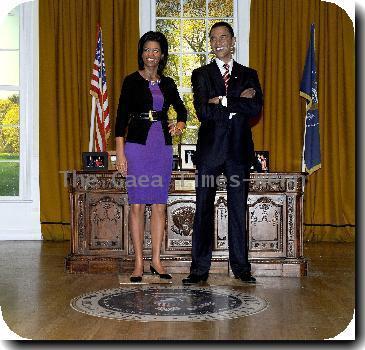US, Russian nuclear negotiators leave Geneva without deal, but will meet again March 9
By APMonday, March 1, 2010
US, Russian nuclear negotiators meet again March 9
GENEVA — American and Russian negotiators have left Geneva after failing to conclude a new nuclear weapons treaty in their latest round of talks, a U.S. official said Monday.
The two sides will meet again March 9, said Michael Parmly, spokesman for the U.S. mission in Geneva.
The long-running negotiations about a successor to the 1991 Strategic Arms Reduction Treaty were supposed to be finished before it expired Dec. 5. That treaty limited the number of nuclear warheads and carrier systems each side could deploy.
Last week, Russia’s military chief said a deal would be reached soon, and President Barack Obama called his counterpart Dmitry Medvedev to help accelerate an agreement.
But Parmly declined to say when the talks might conclude.
“The U.S. and Russian delegations have returned home from the last round of negotiations for consultations,” he told The Associated Press. “Both sides are continuing to work and consult with one another.”
Russian Gen. Nikolai Makarov said last week that a key obstacle centered on U.S. plans to place missiles in Eastern Europe to shield against potential launches from Iran or North Korea. He said there were concerns the missile defense was aimed against Russia.
Last month, Romania agreed to install anti-ballistic missile interceptors as part of the revamped U.S. missile shield to replace a Bush-era plan for interceptors in Poland and radar in the Czech Republic.
Obama’s decision to scrap the missile defense sites designed to shoot down long-range missiles from rogue states such as Iran drew praise from the Kremlin, which had fiercely opposed the earlier plan as a threat.
Experts have said the new plan is less threatening to Russia because it would not initially involve interceptors capable of shooting down Russia’s intercontinental ballistic missiles.
Obama, in his telephone conversation with Medvedev, cited the need to press negotiators to complete the elusive pact, which would sharply reduce the two countries’ arsenals of long-range nuclear weapons, according to a White House official.
Other problems in the talks are believed to concern monitoring and verification procedures. Obama and Medvedev agreed in July that warheads should be capped at 1,500 to 1,675 from about 2,200 each side has now.
Tags: Barack Obama, Eastern Europe, Europe, Geneva, International Agreements, North America, Nuclear Weapons, Russia, Switzerland, United States, Weapons Administration, Weapons Of Mass Destruction, Western Europe



